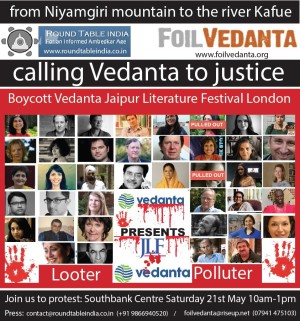 17th May. On 14th May we released an open letter calling for the renowned authors and artists participating in the Jaipur Literature Festival at Southbank, London, to pull out of the event in view of its sponsorship by Vedanta Resources – dubbed ‘the world’s most hated company’. The letter has now been signed by over 100 writers, academics, activists and people directly affected by Vedanta’s operations, including poets Nabina Das, Hemant Devate, Rafiq Kathwari and Surya Vahni Priya Capildeo and writers Tariq Mehmood, Hansda Sowvendra Shekhar, Courttia Newland and Gladson Dungdung.
17th May. On 14th May we released an open letter calling for the renowned authors and artists participating in the Jaipur Literature Festival at Southbank, London, to pull out of the event in view of its sponsorship by Vedanta Resources – dubbed ‘the world’s most hated company’. The letter has now been signed by over 100 writers, academics, activists and people directly affected by Vedanta’s operations, including poets Nabina Das, Hemant Devate, Rafiq Kathwari and Surya Vahni Priya Capildeo and writers Tariq Mehmood, Hansda Sowvendra Shekhar, Courttia Newland and Gladson Dungdung.
In response two speakers have already pulled out. The scientist and broadcaster Aarathi Prasad and K. Satchidanandan, a Malayalam and English poet have both refused to participate. (Please see the full article critiquing the neocolonialist approach of the Jaipur Literature Festival by Kavita Bhanot here)
Despite this, Sanjoy Roy, the managing director of Teamwork Arts, which produces the festival, issued this statement to the media on behalf of the festival organisers Namita Gokhale and William Dalrymple:
‘While we appreciate the concerns of those who have posted the open letter, we remain an open platform that allows for free thought and expression. Our strength continues to be our programming, the speakers and the quality of free and frank discussions that JLF brings to audiences. Our sponsors do not influence these choices nor have a say in our content.’
As we wrote in the original letter, literature does not exist in a vacuum, and neither does ‘free and frank discussion’. Content cannot be separated from sponsorship; it will influence the orientation of programming. In any case, the unaddressed fact remains, that in accepting Vedanta sponsorship the festival is promoting the company, and actively supporting its efforts to whitewash its crimes. This is very apparent in the email response that JLF/Teamwork is giving to concerned speakers which claims:
‘its so difficult to figure the colour of money and whose money we should or shouldn’t take…The larger issues we appreciate but as a journo had mentioned we do not understand what is fact or fiction in the vedanta matter …. They have not been prosecuted nor convicted in any of the alleged crimes they are supposed to have committed …. Why then are we expected to stand judgment and take a call as to the colour of their money?’
We wish to strongly refute this irresponsible and ignorant stance and point out their weight of evidence of Vedanta’s corporate malpractices, which has even led to institutional investors such as the Church of England, the Norwegian Pension Fund and The Rowntree Trust divesting from the company over human rights issues. Even the former Director General of the Confederation of British Industries (CBI) criticised Vedanta for bringing the London Stock Exchange into disrepute.
In fact Vedanta have been convicted and prosecuted in multiple cases of pollution, negligence causing worker’s deaths, insider trading, illegal mining and breach of contract which are well documented:
On 1st April 2015 the Supreme Court of Zambia upheld an earlier 2011 High Court judgement found Vedanta’s 74.9% subsidiary Konkola Copper Mines (KCM) guilty of ‘gross recklessness’ in polluting the River Kafue, which supplies drinking water to 40% of Zambians, in 2006. A case against Vedanta for ongoing contamination of communities living on the Kafue is currently being heard in the Court of Technology and Construction in London. In February 2014 KCM were fined $90 million in the London International Court of Arbitration for terminating Brazilian miner U&M’s contract without reason or payment.
In 2012 the Supreme Court of India found Vedanta subsidiary Sesa Goa guilty of large scale illegal mining and banned it from mining in Goa and Karnataka. The Indian Government has cancelled environmental clearance granted to Vedanta-owned Sesa Goa for the Pirna iron ore mine, finding “deliberate concealment and/or submission of false or misleading information or data” in its environment impact assessment study.
Vedanta’s precursor Sterlite Industries was banned from the Bombay Stock Exchange for two years in 1998 for insider trading involving the infamous shady stockbroker Harshad Mehta.
The Bakshi Commission judicial inquiry found Vedanta subsidiary BALCO guilty of negligence and using sub-standard materials and construction methods which caused the collapse of a chimney which killed between 40 and 100 people in 2009.
These major cases are just the tip of the iceberg and there are hundreds of local cases and convictions against the company for illegal cutting of reserve forest, unpaid wages, pollution incidents, failure to comply with environmental laws and much more, as a brief internet search will reveal.
Once again we call on the participating authors and the festival organisers to break their association with this criminal company, who are seeking to gain some much needed credibility for their tattered reputation from this high profile event.